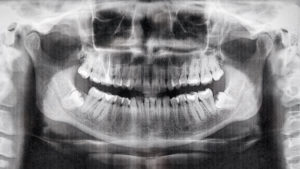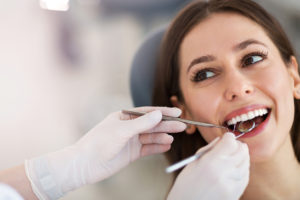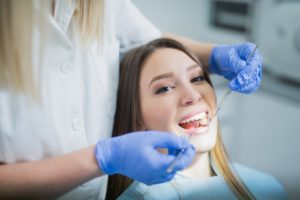Preventive Dentistry in Warrensburg and Oak Grove, MO

Healthy Smiles For Life
At Ridgeview Family Dental, we’re dedicated to providing top-notch preventive dentistry services to help you maintain good oral health and prevent dental problems from developing. From routine check-ups and cleanings to advanced treatments such as dental sealants and fluoride treatments, our team of experienced dental professionals is committed to helping you achieve a healthy, beautiful smile. Our Missouri dentists, Dr. R. McKell Young, Dr. Jason Kingsolver, and Dr. Riley Anderson believes that preventive dentistry is the key to long-term oral health, and we strive to make each visit to our office a positive and comfortable experience.
What is Preventive Dentistry?
Preventive dentistry focuses on helping patients avoid developing tooth decay and other dental conditions that can be costly and invasive to treat. This prevention consists of a combination of regular dental checkups along with maintaining good oral hygiene habits like brushing and flossing. At Ridgeview Family Dental, we aim to demonstrate the importance of maintaining good dental health by helping patients look and feel their best while achieving great overall health.
What Is Tooth Decay?
Tooth decay is damage to the integrity or structure of a tooth and is caused by the buildup of harmful bacteria on the surface. Your mouth has a microbiome that is filled with healthy bacteria responsible for breaking down food as well as extracting nutrients to deliver to the rest of your body. If food is left sitting in your mouth for too long or if there is an influx of sugar, it can throw off the balance of that microbiome and lead to the development of unhealthy bacteria.
Proper hygiene techniques such as brushing, flossing, and rinsing after meals paired with routine dental appointments keep this unhealthy bacteria under control. However, if left ignored or untreated, the bacteria will accumulate on your teeth and form a film-like, sticky substance called plaque. Without proper care, the plaque will harden into tartar (calculus) which can only be removed with professional dental tools and skills.
The bacteria in plaque and tartar eat away at your gums and teeth. Your teeth do have a protective coating called enamel but if the bacteria penetrate it, tooth decay will set in, causing hollow spaces in your teeth called cavities. Once your enamel has been breached, the bacteria will continue to eat away at your teeth from the outside in which can lead to the need for root canals and even tooth extractions. Untreated tooth decay causes other serious conditions like periodontal disease and heart disease.
Establishing a consistent at-home oral care routine in tandem with Dr. Young’s preventive services can keep your mouth clean and your smile healthy.
Teeth Cleanings, Dental Exams, & X-Rays
One of the most important components of keeping your teeth healthy is to prevent tartar and plaque buildup, which can be accomplished by regularly visiting the dentist. The American Dental Association recommends patients visit the dentist for regular cleanings and dental exams once every six months or twice a year. Even if you feel like your teeth are in excellent condition, checkups are still necessary and helpful. These checkups allow us to thoroughly clean your teeth and detect any potential problems.
At your regular dental appointments, our dental hygienists will ensure that every tooth is squeaky clean and plaque-free. After your professional cleaning, Dr. Young will check your x-rays and visually examine your teeth for any signs of decay and other dental problems.
Dental Sealants
You may notice that you have grooves and crevices on the chewing surfaces of your molars, which is normal. However, if bacteria and food debris accumulate in these areas, it can lead to cavities and tooth decay. We’ll examine your teeth for any large grooves and may recommend dental sealants.
Dental sealants are clear, plastic coatings that we apply over the targeted area to protect against cavities and tooth decay. This treatment gives patients an added layer of protection for their smiles.
Oral Cancer Screenings
Oral cancer screenings involve a visual and physical examination done by Dr. Young during your biannual dental appointments. He’ll check your cheeks, throat, neck, and face for any abnormalities. The goal of oral cancer screenings is to identify oral cancer early on, which leads to a much better chance of successful treatment.
Our Preventive Dentistry Tips

- Brush two times a day for two minutes.
- Use a soft-bristled toothbrush that comfortably fits your mouth.
- Replace toothbrushes every two to three months.
- Use fluoride toothpaste.
The way you brush your teeth is important as well. Try doing the following when brushing:
- Hold your toothbrush at a 45-degree angle rather than using straight force.
- Use short strokes when moving the toothbrush across the teeth. Press gently because brushing too hard causes abrasion to the gums—leading to possible inflammation and gum recession.
- Touch the inner and outer surfaces with several strokes, and then the chewing surface.
- To brush the inner surfaces of the front teeth, turn the brush vertical and use very short-up-and-down strokes.

When plaque builds up in hidden places, it can cause inflammation and infection that affects the mouth as well as the body. Here are some guidelines to follow when flossing:
- Use a string of floss about 18 inches long and wrap each end loosely around a finger.
- Slide a tight string of floss between two teeth, sliding it up gently to remove pesky invisible plaque. As you slide the floss, curve it slightly around the base of the tooth as you go. Make sure that you allow the floss to flow beneath the edge of the gums to reach areas that are susceptible to bacteria.
- As you move from one tooth to the next, move your hands to reveal clean sections of floss for use.
If you have any questions about your flossing technique, ask your dental hygienist at your next appointment.

A balanced diet that includes foods high in calcium (milk, yogurt, and spinach) as well as crunchy vegetables, fruits, and nuts naturally cleanses and fortifies your enamel.
Frequently Asked Questions
Preventive dentistry is the modern way of helping keep your smile and oral health in great condition. By practicing preventive dentistry, we’re able to prevent unwanted disease as well as catch developing problems early on, allowing for simpler, less invasive treatments in the future.
We recommend getting professional dental cleanings once every six months. Even if you take proper care of your teeth, there are still hard-to-reach areas in the mouth that may not get cleaned as often as they need. Eventually, plaque and tartar can build up and lead to cavities and oral disease.
At your dental cleaning, our team will make sure all areas of your mouth are clean and healthy. We may also take x-rays of your teeth to see any areas of decay that aren’t visible to the human eye. This allows us to provide treatment as soon as possible to avoid further damage.
Many dental insurance plans cover preventive dental care such as check-ups and cleanings. However, the extent of coverage may vary depending on your plan, so it’s important to check with your insurance provider to understand your benefits.
Yes, children can greatly benefit from preventive dentistry. Regular dental check-ups and cleanings, along with fluoride treatments and dental sealants, can help prevent cavities and other dental problems in children. Starting preventive dentistry early can establish good oral health habits that can last a lifetime, and can help children avoid more serious dental problems as they grow older.
Achieve Excellent Oral Health
Preventive dentistry is important to your overall health. By maintaining an excellent oral hygiene routine and regularly visiting Dr. Young for biannual dental checkups, you can help avoid future dental issues. To learn more about preventive dental services or to schedule an appointment, contact one of our dental offices in Warrensburg or Oak Grove, MO by calling (660) 747-9117 or filling out the contact form at the bottom of this page.









